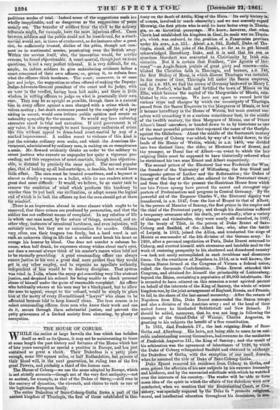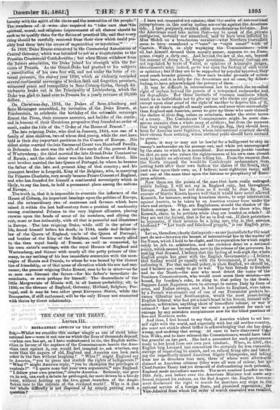THE HOUSE OF COBURG.
WHILE the nation at large bewails the loss which has befallen itself as well as its Queen, it may not be uninteresting to trace at some length the past history and fortunes of the House which has of late years occupied so special a position in Europe, ;la has just sustained so great a check. Their Dukedom is a petty place enough, some 800 square miles, or half Rutlandshire, but princes of their blood will, in the next generation, be ruling two of the five great Powers, and probably a third of the human race.
The House of Coburg—we use the name adopted by Europe, which is not strictly accurate—though not of the very first antiquity,—not so ancient, for example, as that of the Dukes of Savoy,—still rose in the century of dynasties, the eleventh, and claims to rank as one of the legitimate European family.
The entire Dukedom of Saxe-Coburg-Gotha forms a part of the ancient kingdom of Thuringia, flue first of those established in Ger- many on the death.of Attila, King of the Huns. Its early history is, of course, involved in' mach obscurity; and we can scarcely regard Merewig,-the first prince who is.said to have borne sway in Thurin- gia, asi, nn :historical personage.. We know, however, that when
ilk,bad established his kingdembGaul, he made war on Thurin- gia, which wee:reduced to thiaunoaltion of a Foecqpian province
sader his sops,' Yarn. 551. , nt1,4.4.b.043, Radnlf, Duke of Thu-
.
-rjagia, shook ,aff,-tbe yoke of ,t ftriiink% so farwaa. to get himself aelcepwledged Hereditary aaikli.,40, his son or igyffpelisen Gozobert was couv iChristiantty by linenirtga. But it is certainAnIfoi",e Apostle O many' —an Angle-SmE?it prelite re , geat,. wetyud renown7-esta- blished the Cluiitlin faith' Thuringia; and 'became, A.D. 746; the first Bishop of Meni-, in which diocese Thuringia was included. In due colirse ,of tinik,Thuringia fell wider he Saxon emperors, and, WO.' 9fil, we fitia'the crown of GelteVtiOWOWOlin`Henry I. (or the Fowler), who built and fortified'tbe 'there 'ofltfiania on the Elbe, which became the capital of the Margraiiiite Misnia, esta- blished by thie sovereign. We Jove not space to record here the varioni lit4iS' Lid" elanes' the , ioverei`gaty. Of Thuringia passed frOm the Saicm'Etaperois to the Margrayes of Misnia, or how it becamehOitrttary in the House of Wettii,' het'inust content our. selves with red-larking it as a curious coineidelieWthat, in the middle of the twelfth''Oentary, the then Margrave of Misnia; one'Of Prince Albert's linearaneestiera; is handed dOWn to as by historians as one of the most powerful Minces that esPoused the cause of the Guelphs against the Ghibelines. About the middle of the fourteenth.eeiiiiiri the territory Of Coberg Was added,' by-way of a bridal doWei-',tOhe lands of the 'Houie of 'Wettin, whick; in A.D. 1485, was divided into -two distinct -lines, the elder, or Electoral line of Ernest, and the younger, or Ducal line, of Albert—an event to which the late- reigning Duke must, be supposed to have historically referred when he christened hie two sons Ernest and Albert respectively.
The second prince Of the' Electoral. line was Frederick the Wise, the founder of the University of Wittenberg, the firm friend and courageous patron of -Luther and the Reformation; the Dukes of Saxony of the:line-of Albert, also adhered to the 'Protestant cause; and from that day to -the 'present the illustrious House from which our late Prince sprang have proved the surest and strongest sup- porters of Protestautisni-and.progress in Central Germany. —By the powerful aid of the Elnperor Charles V., the Electoral dignity was transferred, in A.D. 1547, from the line of Ernest to that of Albert, in the person of Maurice of Saxony, the first prince in the empire and the chief of the Protestant party; and though his dominions suffered a temporary severance after his death; yet eventually, after a variety of changes and vicissitudes, they were ,nearly all-reunited, in 1807, by the treaty of Tilsit, in the person of Duke Ernest of Saie- Coburg .and -Saalfeld, of -the Albert line, Who, after the -battle of Leipzig, in 1813, ,joined. the Allies, and Conducted the siege of Maintz as commander of the 5th division oLthe German army. In 1808, after a personal negotiation at -Paris, Duke Ernest returned to Coburg, and exerted himself with-strenuous and laudable zeal to the work of restoring prosperity to his shattered and disordered -country; —a task not, easily,accomplished in such tronblous and disastrous times, On the overthrow of.Napoleou in .1814, as is well known, the German States formed -at, the Congress-of -Vienna a federal union, called . the Germanic Confederation. -.Duke Ernest attended this Coegress, and obtained for. himself the principality of Lichtenberg, beyond the Rhine, containing a population of 26,000 inhabitants. He is recorded to have uttered ma. this occasion tetiOst spirited protest on behalf of the interestsiolftlieiKing,of, Saxony, the whole of 'whose kingdom was, by the joint arrengement of England, Russia, and, Prussia; to fall to the share of the lest-awned monarchy. -After the return of Napoleon from Elba, Duke Ernest , commanded the Saxon troops,' q.nd also a division of the Austrian army ; and at the head of their United forces he blockaded- Schlettstadt Ind New Brisacii. It tihould be added, moreover, t.hplie ,iyaa ;Apt, long tin following the 4xample of the Grand-Dad' Of Weim,—Cliarles Augustus, in granting to his subjects the benett of n free constitution. In 1825, died,Frederieki Pirq _Abe last, reigning, Duke of Saxe- Gotha awl, Altenburg. A4s,4*„ not ,beieg_able, to come.to. an ami- cable understanding among themselves, had recourse to the mediation of Frederick Augustus III., the .King of Saxony-; and the result of his arbitration was the agreement of inheritance of 1826, by which the Duke of Coburg relinquished Saalfeld and obtained' in exchange the Dukedom of Gotha, with the exception of ofieSmall domain, when he assumed the title of Duke of Saxe-Coburg-Gotha.
Duke Ernest removed his residence from Coburg to Gotha, and soon gained the affection of his new subjects by his extreme humanity and kindness, and by the unwearied solicitude with which- he watched over the interests of his country. The reader will be able to form some idea of the spirit in which the affairs of the dukedom were now conducted, when we mention that the Ecclesiastical Court, or Con-.„ sistory, was specially required by the Mike to "promote religioqk.:. moral, and intellectual education throughout his dominions, in elm- . formity with the spirit DLO*, tines anclAhealeoes-sities, of the people.": The members of it 'mires aladi-requiredatio:11:taikericiare Ant 'the. spiritual, moral, and religions improvement of all claineif should be such as'to qualify them for-the duties of practical life, and that every thing should be carefidli•iiiiintrekid, from their view which could pos- sibly lead them into the ettoratif Superstition or mysticism."
In 1828, Duke Ernest ethicuired in the Commercial Association of Central Germany, which was intenitied",tUadt';as; a'niatitterpbtee to the Prussian Commercial Confederal:km.0W wlieritfii44, vht:i4reir from the former association '1116'Diiice'1citOtt1ii strength With'the for- tunes lif Prus '''As.'the' Grand-Duke Mt& eted to his subjects
a.
a con4Otion 11 '44'n free will, and 'notWilder the force of ex- terniressure, the s n 'my year 1830, which So violently reminded
.11' ,
STM , pontinental sorm inoken faith andlorgotten promises, ..
Witnessed peace and tranzt! kin Saxe-Coburgillpetha, though dis• , turbances broke out in * moipality4dIrAetinberg' which the p49 yas gladitp hand over to Prussia fer l .ce`gtef revenue of 80,000 413jrarin L ; . - , . , 59'1 i: , ;.: '1 .fil;i• -1,.'--. ...:1 . ,.._:44.,,Pillign)41011ffwA03;i the Duloes,...,og *, , topianrg and SaXe•Meiningen assembleduby invitation 4;4, ,o, *pest, at Friedeestein, to celebrate ,U birthday of the estimnhiedaerereige Erneeh1t4ei Pious), tlie*.pocereon aecestor, awl lanilderpg.thei prastlei and in honour of their illustrious progenitor they founded-an order of merit, under the title of the " Order of the Ilouse of Ernest.'!: The late reigning Duke, who died in ,January, 1844, was one of a familyrnf , nine. Odd ren, two of whom died young, :while the XestAs1?0, held.* their day important positions in the Courts of 'Nuropsii-Ailis eldest sister married tilelate Emmanuel Count terkMensdoiff Pouillgi in Bohemia ; the next was the wife of the:uncle-0f ;the , present King of Winteraberg; the third married the late, OrtindlDuke Poustentine of 114ial : and, the other: sister was the leto Thichess of Kent. , Alia next brother, married the late Queen of Portugal, by whom be became tba,fp,thpxbi of the late and present king of that . conntiry4,andi ibis yowignatlarotber is Leopold, King of the Belgians, who, inoarrying thp Vainness .Charlotte, very nearly became. Prince Consort P C England, - and who has founded for himself , a continental sovereignty Which likely, to say the least, to hold a.permanent place among the nations
of Europe. .
The truth is, that it is impossible to overrate the influence . of the House of Coburg, its important bearings upon the politics-of Europe, and the extraordinary raw of successes and: .favours which have raised it within the last half-century from a position of medipority among continental Princes to the very . highest alliances, placing crowns . upon the heads of some of • its members, and allying, the rest, nore or less intimatelyovith alktliat is 'powerful and illustwioni in Europe. ; The- late.; treigning.,Dukeiti while, still in the Milne I of life found himself ,beforohil death"- in t844, uncle and fatherf ' law of the i Queen: lefoErigland, ' Uncle : of the 'Queen of .Portugia and brother of the King of the Belgians, and 'thence nearly allied to the then royal i family of,,' Prance; -as rwell,- as :cormected,• --by his .own sisteesbnuirriage, withathei royal: Honies, of -England and Wurtemberg, , and 'thence withAlearlY all ...the 'petty princes of 'Ger!' many, to say nothing of his less immediate ;connexion with the so , reigns of Russia and Prussia, to whom he MIS bound by the closest', ties of friendship, or of that acme of elevation.whielrhisson andsuc- cessor, the present reigning Duke Ernest, setiii2telititin stkreu-Lso far as men can foreoast the future—for his-tatcher's immediate de- scendants, or even perhaps for Iiiinself: TIte;. descendants of the little Margraviate of Misnia will, in all human probability, sit, in 1880, on the thrones of England, Germany, Holland, Belgium, Por- tugal, and it may be two other c'tireatEnropeatt,..fitaleS, While the Bonapartes, if still enthroned, will be thelonly•House not connected with theirs by direct relationship.































 Previous page
Previous page